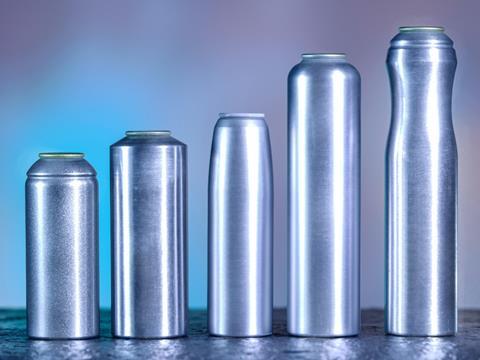
The International Organisation of Aluminium Aerosol Container Manufacturers (AEROBAL) has reported a 6.8% increase in its members’ global shipments in 2022, raising the total figure to approximately 6 billion units – a development driven by rising demand from the personal care and pharmaceutical industries and from European and American customers.
AEROBAL attributes the market growth to a 13% rise in demand from the pharmaceutical sector; a 17% rise in the hairspray sector; a 14% rise in the shaving foam sector; and a 42% rise in other personal care sectors, all in comparison with figures from 2021.
The volume-dominant deodorant and perfume sectors are also said to have seen a rise in demand of just under 4%, with the personal care market thought to make up 82% of AEROBAL members’ total deliveries.
Demand is claimed to have grown by around 10% amongst the EU’s 27 Member States, in this case including the United Kingdom. Alongside the 6% increase in deliveries to North and South America, the regions collectively account for around 71% of AEROBAL members’ deliveries, according to the organisation.
Although Asia and Australia are reported to have seen a 6.7% increase in demand over the course of last year, deliveries to the Middle East decreased by almost 4%, says AEROBAL.
Looking forward, the proposed revisions to the Packaging and Packaging Waste Directive are expected to raise challenges for European manufacturers and importers – especially its focus on minimising packaging designs, improving design for recycling, and documenting requirements and declarations of conformity.
AEROBAL is also expecting ‘satisfactory market development’ within the first quarter of 2023, yet warns that the ongoing conflict between Russia and Ukraine, continuing inflation, and the threat of an oncoming recession in various countries may still cause problems for the industry.
“The aluminium aerosol can industry is currently facing two major challenges,” explains Wan Tsang Lin, president of AEROBAL. “First, a lack of adaptability of machinery for the production of innovative aerosol cans. In addition, the availability of technicians and skilled labour has become a crucial competitive factor in the industry.
“It is true that in the past the packaging markets were comparatively resilient even in times of crisis. However, the loss of purchasing power among consumers could ultimately also have a negative impact on the FMCG markets and thus also on the personal care market.”
Nevertheless, he remains optimistic about sustainable progress for aerosol cans in Europe: “The proven innovative strength of the can industry, the outstanding material properties of aluminium and the material’s optimal recyclability will contribute to resource-efficient packaging solutions that convincingly meet the new legal requirements.”
Last September, the organisation reported a 5.5% increase in its members’ global shipments since the first half of 2022, raising the figure to 3 billion units.
Other developments in aerosol packaging include Plastipak’s SprayPET Revolution aerosol container, said to be 100% polymer and completely recyclable; and Ball Corporation’s aerosol can apparently made from the company’s lightweight ReAl alloy, aluminium smelted using renewable energy sources, and 50% recycled content.














No comments yet